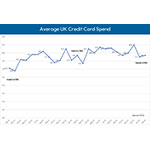Continued signs of financial pressures: credit card balances creep up and payments to balance fall
LONDON–(BUSINESS WIRE)–The FICO UK Credit Card Market Report for February 2024 presents a mixed picture on consumer confidence and financial pressures. There was an uptick in spending after the usual seasonal dip in January and the number of people missing one and two payments fell. However, payments to balance fell by 3.6% compared to February 2023 and the average balance is higher than the previous month and previous year.
Highlights
- Average spend increased 1.55% over January 2024, reaching an average of £785
- With inflation still higher than the same period in 2023, spend remains higher year-on-year
- Payments to balance fell by 3.1% from January, with just 36.5% of outstanding balances paid in February and balances increasing 0.1% to £1770
- Fewer customers missed one or two payments compared to the previous month, but figures remain higher than 2023
- There was a slight year-on-year and month-on-month increase in the number of customers missing three payments
Key Trend Indicators – UK Cards February 2024
Metric | Amount | Month-on-Month Change | Year-on-Year Change |
Average UK Credit Card Spend | £785 | +1.6% | +0.3% |
Average Card Balance | £1,770 | +0.1% | +6.6% |
Percentage of Payments to Balance | 36.47% | -3.1% | -3.6% |
Accounts with One Missed Payment | 1.5% | -10.9% | +5.5% |
Accounts with Two Missed Payments | 0.33% | -10.3% | +3.6% |
Accounts with Three Missed Payments | 0.22% | +1.8% | +2.2% |
Average Credit Limit | £5,645 | +0.2% | +1.7% |
Average Overlimit Spend | £85 | 0% | -6.5% |
Cash Sales as a % of Total Sales | 0.86% | -0.2% | -0.1 |
Source: FICO
FICO Comment
UK credit card spending has started to pick up, after the usual seasonal dip in January, increasing by 1.6% on the previous month to an average of £785, an increase of 0.3% on 2023. Although inflation is now stabilising, inflation does remain higher than last year; spend patterns are, therefore, likely to remain high. Higher inflation rates also continue to impact the average credit card balance, which is now £1,770 – 6.6% higher than February 2023.
Credit card providers will also want to monitor the percentage of the total balance being paid. In February this dropped to 36.5%; a 3.1% decrease compared to January and 3.6% lower year-on-year. This has been trending down since May 2022, with reduced pandemic savings no longer helping to pay down balances as much as they were previously.
Lenders will, however, be encouraged that the pattern of missed payments stabilised in February. The number of customers missing one credit card payment decreased by 10.9% month-on-month, to 1.5%. This measure has been erratic for many months, although it has been trending upwards since April 2022. There is also a more obvious overall upward trend for customers missing two payments; especially for those who have had their credit card for less than five years. However, following the usual Christmas spike, this decreased by 10.3% month-on-month in February to 0.3%, while remaining 3.6% higher than the same month in 2023.
Another important data point is the average balance on accounts with one missed payment. This has increased for the second consecutive month and now stands at an average of £2,255. This is also 5.7% higher than the same period in 2023. For customers missing two payments, this has increased by 4.7% month-on-month to £2,705, with a larger number of accounts and balances missing payments rolling forwards in their delinquency.
Although the number and average balance of one, two and three missed payments is trending upwards, the balance of customers not missing payments has also been trending upwards. The rate of missed payment balances to the overall up-to-date balance has remained flat since the start of 2023; this suggests that collections and limit management risk strategies are effective at controlling customers spending capabilities.
One other measure that credit card providers continue to monitor closely is the percentage of customers taking out cash on their credit card. This continues to decrease; it’s down 2.2% on the previous month, although it remains 3% higher than the previous year, now standing at 3.3%. This has been trending down since September 2023 but if it follows the same trend as 2023, it is likely to stabilise within the next couple of months.
These card performance figures are part of the data shared with subscribers of the FICO® Benchmark Reporting Service. The data sample comes from client reports generated by the FICO® TRIAD® Customer Manager solution in use by some 80% of UK card issuers. For more information on these trends, contact FICO.
About FICO
FICO (NYSE: FICO) powers decisions that help people and businesses around the world prosper. Founded in 1956, the company is a pioneer in the use of predictive analytics and data science to improve operational decisions. FICO holds more than 200 US and foreign patents on technologies that increase profitability, customer satisfaction and growth for businesses in financial services, insurance, telecommunications, health care, retail and many other industries. Using FICO solutions, businesses in more than 100 countries do everything from protecting 4 billion payment cards from fraud, to improving financial inclusion, to increasing supply chain resiliency. The FICO® Score, used by 90% of top US lenders, is the standard measure of consumer credit risk in the US and other countries, improving risk management, credit access and transparency. Learn more at www.fico.com.
FICO and TRIAD are registered trademarks of Fair Isaac Corporation in the U.S. and other countries.
Contacts
For further comment on the FICO UK Credit Card activity contact:
FICO UK PR Team
Wendy Harrison/Parm Heer
[email protected]
0208 977 9132







01
From telecom veteran to Dutch Startup Visa success: The Jignesh Dave story